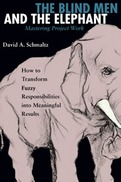The Blind Men and the Elephant
Mastering Project Work
David Schmaltz (Author)
Publication date: 04/09/2003
Bestseller over 25,000+ copies sold
If you work, you probably manage projects every day-even if "project manager" isn't in your official title-and you know how frustrating the experience can be. Using the familiar story of six blind men failing to describe an elephant to each other as a metaphor, David Schmaltz brilliantly identifies the true root cause of the difficulties in project work: "incoherence" (the inability of a group of people to make common meaning from their common experience).
Schmaltz exposes such oft-cited difficulties as poor planning, weak leadership, and fickle customers as poor excuses for project failure, providing a set of simple, project coherence-building techniques that anyone can use to achieve success. He explains how "wickedness" develops when a team over-relies on their leader for guidance rather than tapping their true source of power and authority-the individual.
The Blind Men and the Elephant explores just how much influence is completely within each individual's control. Using real-world stories, Schmaltz undermines the excuses that may be keeping you trapped in meaningless work, offering practical guidance for overcoming the inevitable difficulties of project work.
If you work, you probably manage projects every day-even if "project manager" isn't in your official title-and you know how frustrating the experience can be. Using the familiar story of six blind men failing to describe an elephant to each other as a metaphor, David Schmaltz brilliantly identifies the true root cause of the difficulties in project work: "incoherence" (the inability of a group of people to make common meaning from their common experience).
Schmaltz exposes such oft-cited difficulties as poor planning, weak leadership, and fickle customers as poor excuses for project failure, providing a set of simple, project coherence-building techniques that anyone can use to achieve success. He explains how "wickedness" develops when a team over-relies on their leader for guidance rather than tapping their true source of power and authority-the individual.
The Blind Men and the Elephant explores just how much influence is completely within each individual's control. Using real-world stories, Schmaltz undermines the excuses that may be keeping you trapped in meaningless work, offering practical guidance for overcoming the inevitable difficulties of project work.
- Presents a set of simple, proven techniques that all can use to increase their projects' coherence and overcome common project difficulties
- Adds the ingredient most often absent from discussions of project work-you and what you can do to influence your own experience
- The Blind Men and the Elephant is a powerful metaphor for understanding project management
Formats
Paperback - $18.95 - Members: $17.06
Paperback - $18.95 - Members: $17.06
PDF eBook - $18.95 - Members: $13.27
ePub - $18.95 - Members: $13.27
Find out more about our Bulk Buyer Program
- 10-49: 20% discount
- 50-99: 35% discount
- 100-999: 38% discount
- 1000-1999: 40% discount
- 2000+ Contact Leslie Davis ( [email protected] )
Orders of 10+ copies shipping to one address receive free ground shipping
within the U.S. Shipping to separate individual addresses via USPS media mail will be applied a handling fee:
Book Details
Overview
If you work, you probably manage projects every day-even if "project manager" isn't in your official title-and you know how frustrating the experience can be. Using the familiar story of six blind men failing to describe an elephant to each other as a metaphor, David Schmaltz brilliantly identifies the true root cause of the difficulties in project work: "incoherence" (the inability of a group of people to make common meaning from their common experience).
Schmaltz exposes such oft-cited difficulties as poor planning, weak leadership, and fickle customers as poor excuses for project failure, providing a set of simple, project coherence-building techniques that anyone can use to achieve success. He explains how "wickedness" develops when a team over-relies on their leader for guidance rather than tapping their true source of power and authority-the individual.
The Blind Men and the Elephant explores just how much influence is completely within each individual's control. Using real-world stories, Schmaltz undermines the excuses that may be keeping you trapped in meaningless work, offering practical guidance for overcoming the inevitable difficulties of project work.If you work, you probably manage projects every day-even if "project manager" isn't in your official title-and you know how frustrating the experience can be. Using the familiar story of six blind men failing to describe an elephant to each other as a metaphor, David Schmaltz brilliantly identifies the true root cause of the difficulties in project work: "incoherence" (the inability of a group of people to make common meaning from their common experience).
Schmaltz exposes such oft-cited difficulties as poor planning, weak leadership, and fickle customers as poor excuses for project failure, providing a set of simple, project coherence-building techniques that anyone can use to achieve success. He explains how "wickedness" develops when a team over-relies on their leader for guidance rather than tapping their true source of power and authority-the individual.
The Blind Men and the Elephant explores just how much influence is completely within each individual's control. Using real-world stories, Schmaltz undermines the excuses that may be keeping you trapped in meaningless work, offering practical guidance for overcoming the inevitable difficulties of project work.
- Presents a set of simple, proven techniques that all can use to increase their projects' coherence and overcome common project difficulties
- Adds the ingredient most often absent from discussions of project work-you and what you can do to influence your own experience
- The Blind Men and the Elephant is a powerful metaphor for understanding project management
About the Author
Excerpt
We also recommend
















